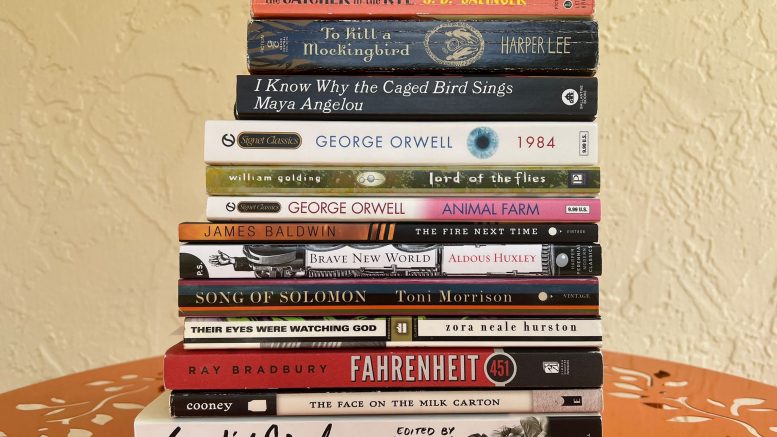Catherine Garton/ Contributing writer
Books and our access to them are imperative. Over the past couple of decades, this access has been wrongfully challenged.
State governments and school boards are banning books in schools across the nation. With the even more apparent rise in hatred and censorship culture, our access to books is more important than ever.
Recently, a Tennessee school district banned “Maus” by Art Spiegelman from eighth-grade classrooms. The graphic novel is about the Holocaust. It uses imagery depicting mice as Jewish people and Nazis as cats. This book takes a heavy topic and makes it digestible for people of all ages to understand.
The Tennessee school board is irrationally banning this novel over “concerns” of “nudity and language.” Teaching history as it actually happened is not offensive. The reasoning behind this ban completely ignores the weight of the Holocaust, basically stating that “nudity” is worse than the genocide that occurred. It shows they would rather “protect” children from what they deem as “harsh” language than allow them access to a story accurately depicting this critical moment in history.
The graphic novel does not depict nudity. Mice in the real world are nude. Real mice do not subscribe to humanity’s standard for clothing.
This ban is not only towards “Maus,” but it extends to books covering topics, but not limited to, race, LGBTQ+ and the environment.
Another book that’s been banned or challenged in Texas schools is “The Hate U Give” by Angie Thomas. The book depicts racism, police brutality and poverty. The reasoning behind the ban is ridiculous. Texas schools banned the novel based on these realities and “foul” language. Again, proving they don’t care about the reality many people face every day.
Readers on TikTok are fighting against book bans under the hashtag #readbannedbooks and #bannedbooks. Readers use the hashtags to discuss their favorite banned books and the history of why they’re banned.
Book bans over the years have only emphasized the rhetoric of hatred lying within our systems and the effort to erase history, which is extremely dangerous. I fear it will only get worse.
Ironically, a book dealing with censorship and its dangers was also banned. Many students, including myself, were required to read this book for their English class. “Fahrenheit 451” by Ray Bradbury was also banned for frivolous reasons.
Books can help people understand the struggles of others, as reading is believed to increase empathy, especially in children. Books expose people to realities and thoughts other than their own.
This is not a distant issue. I remember in my middle school, we were not allowed to read “The Diary of Anne Frank.” This was all because a parent from the year before me threw a fit in the principal’s office about having it taught to students.
The effort to ban books scares me for our future. We, as the older members of our generation, must protect and fight against these bans for future generations to come. So history is preserved, and censorship is fought against. We cannot let censorship win.
Books should not be banned. Books should be read and encourage discussion. Especially books being banned and challenged. Banning a book only bars children from their right to knowledge of the world around them.
DISCLAIMER:
The opinions presented on this page do not represent the views of the PantherNOW Editorial Board. These views are separate from editorials and reflect individual perspectives of contributing writers and/or members of the University community.






Be the first to comment on "Book Bans Harm Younger Generations"